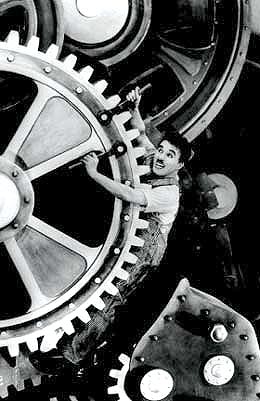
Who needs those boring professionally made safety and health training films? Turns out there are some
old movies that will do just fine, especially in Venezuela:
In his classic 1936 film, "Modern Times," Charlie Chaplin has to work so fast tightening bolts in a steel factory that he finally goes crazy. In a memorable scene that has become a metaphor for labor exploitation, the Little Tramp is run through the factory's enormous gears.
For President Hugo Chavez's socialist government, the film is more than just entertainment: It's become a teaching tool. Since January, in a bid to expose the evils of "savage capitalism," the Labor Ministry has shown the Chaplin film to thousands of workers in places such as this rundown industrial suburb of Caracas.
When the screenings at factories or meeting halls end, Labor Ministry officials then take their cue, and use Chaplin's plight to spell out worker rights under occupational safety laws passed last year and now being applied. They are part of Chavez's sweeping reform agenda that he calls Socialism for the 21st Century.
Chaplin wanted his Depression-era movie to make a point, that "once inside the factory, workers had no meaningful rights," said Los Angeles-based film historian and Chaplin authority Richard Schickel. "It was very relevant in the moment it was released, a time of social unrest and the emerging U.S. labor movement."
Workers can relate:
"The owners still value their machines more than their workers," said Roberto Maldonado, a 29-year-old minimum-wage worker at the Pollo Premium poultry plant, which processes 75,000 chickens a day. "Charlie Chaplin ends up crazy, and I feel that way too sometimes. When I go home, I'm too tired to pay attention to my wife or family."
Freddy Colmenari, a 35-year-old worker at a pasta factory here, said that just as Chaplin's bosses do in the film, his supervisors frequently speed up the assembly line to nerve-racking levels and zealously monitor workers' trips to the bathroom. "There is always pressure and stress," he said.
Management is not amused:
In a formal complaint to Chavez last month, the four main employer associations in Venezuela said that showing a movie depicting the boss as a "vulgar exploiter of workers" was designed to "generate hate and resentment in the labor sector" and "demonize the employer."
An official at the Venezuelan Confederation of Industries, one of the four signatories, said that the new workplace laws were another example of Chavez punishing private industry, a process the groups say has been unrelenting since a failed 2002 coup led by businessman Pedro Carmona.
While insisting they don't oppose workplace safety improvements, business groups here say that they weren't consulted before the new laws were drafted and that now workers and their delegates have too much power to intervene in factory operations.
Jhonny Picone, a top Labor Ministry official, said employees needed all the power they could get. He noted that Venezuelan workers were more likely to describe their job as "a curse from God than as something positive." The grim and dehumanizing factory conditions depicted in the Chaplin film are still the "norm," he said — more than 1,500 workers die and thousands are injured annually in industrial accidents.
And it seems to be effective educating workers about their new rights:
Largely at Picone's insistence, the film has been shown 1,000 times in 14 states and has been effective in educating workers who usually have no clue about their health and safety rights. Labor Ministry officials say it's because the most recent workplace regulations, passed in 1986, were unobserved, a "dead letter."
Workers are told they have a right to demand safety and hygiene precautions, and, through an employee-elected delegate that represents each factory, even to shut down production if owners don't comply. Egregious and repeated safety violations can result in the government taking over a plant.
Sounds like maybe we could learn something.
 Who needs those boring professionally made safety and health training films? Turns out there are some old movies that will do just fine, especially in Venezuela:
Who needs those boring professionally made safety and health training films? Turns out there are some old movies that will do just fine, especially in Venezuela: